IN FOCUS: Thai civil society steps up as Bangkok’s public healthcare buckles under COVID-19
Advertisement
Asia
IN FOCUS: Thai ceremonious society steps up equally Bangkok'south public healthcare buckles under COVID-xix
Every bit the pandemic rages in Thailand, CNA looks at how volunteers accept jumped into action to help those on the margins of society.
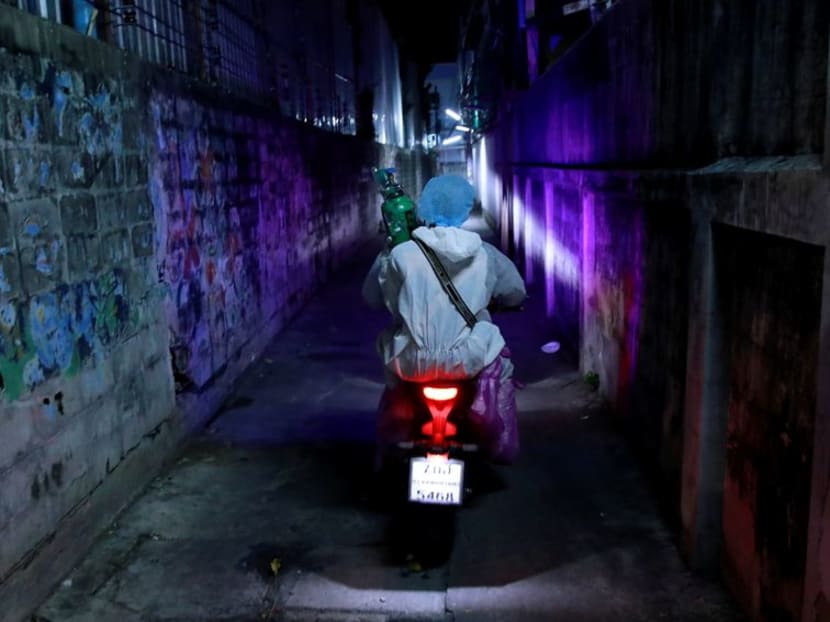
Volunteers travel on a motorbike as they transport an oxygen tank for a coronavirus illness (COVID-19) patient in Bangkok, Thailand August v, 2021. Picture taken on August five, 2021. REUTERS/Soe Zeya Tun
BANGKOK: In April, a video prune of an eastward-sport legend went viral in Thailand.
It was a Facebook alive recording circulate past Kunlasub 'Up' Wattanaphon, who one time led a big due east-gaming association named VGB or Vagabond Team to successfully compete in various tournaments.
"I'1000 close to plummet. I'm quarantining myself now only I don't remember I'll arrive," said the 34-year-sometime ex-gamer in the clip.
He had been trying in vain to seek treatment for COVID-19 for virtually a calendar week and his condition was deteriorating. Coughing and struggling to breathe, Upwards recounted his ordeal with despair.
"The infirmary wouldn't have me. Hotlines didn't aid. Hopeless. I'g going live in case any friends of mine could help. Please help me."
Up was admitted to a hospital the post-obit 24-hour interval. Past then, his lung role was just at 20 per cent. He died 2 days afterwards.
His final Facebook broadcast not just captured his painful moments, merely too put the state of the public healthcare system in the spotlight.
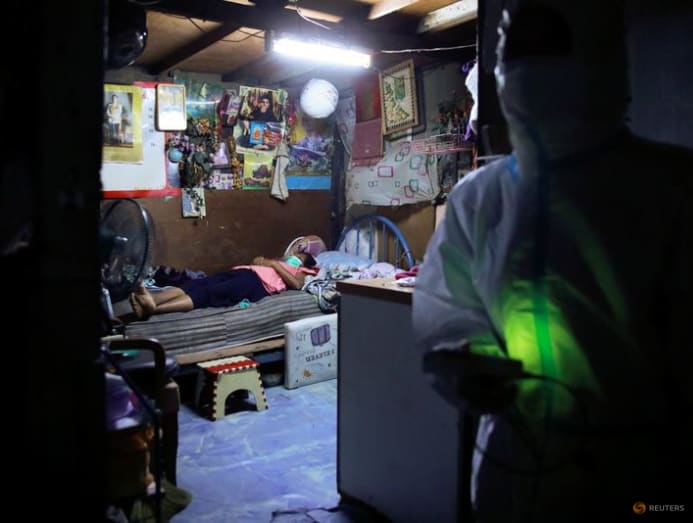
At that time, Thailand was witnessing the start of what would soon become the worst wave of COVID-19 it has dealt with so far.
Infections spread very quickly from 1 of Bangkok's fanciest neighbourhoods, where the wealthy had partied in exclusive nightclubs, into poor communities, crowded prisons and squalid worker camps.
In just over five months, Thailand has reported more than than i.32 million cases and 13,826 casualties. Nearly of the cases are concentrated in Bangkok.
Several months of soaring infections has turned the Thai capital into a hotbed of the pandemic, placing an enormous strain on its public health infrastructure.
Many people have been left frustrated and disappointed by the authorities's handling of the health crisis amid reports of limited testing, full infirmary beds and shortages of vaccines.
Voluntary groups started past ordinary citizens take since jumped into action, doing whatever they can to help the most vulnerable people.
ZENDAI: A SOCIAL THREAD THAT SAVES LIVES
For Bangkok residents, each day begins with reports of thousands of new infections. But for Kamonlak 'Mahmud' Anusornweeracheewin, a former inmate on death row, his twenty-four hour period starts with a race confronting fourth dimension to save equally many lives as he tin.
He walked gratuitous from prison after serving 15 years and 10 months for drug charges. His sentence had initially been reduced to life imprisonment, and good behaviour later resulted in him being released.
Currently, he volunteers with a COVID-19 response group called Zendai to rescue people in critical condition. Many of them are old, devitalized and living alone, with no family fellow member to care for them.
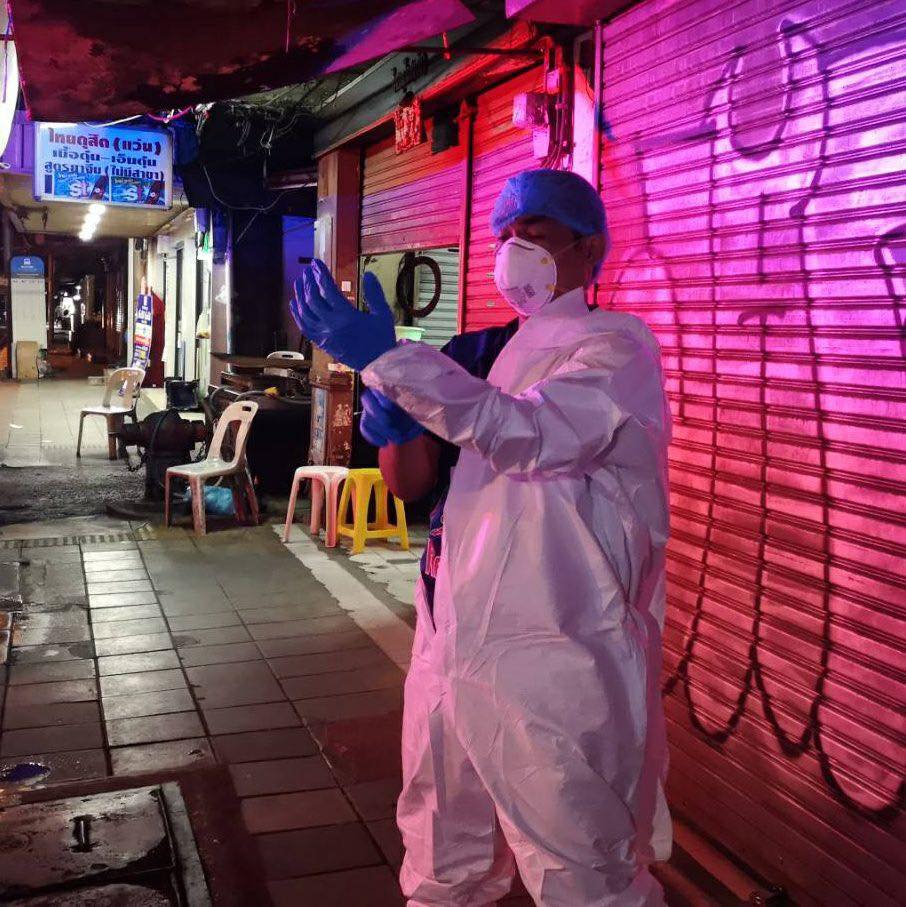
Mahmud, 41, knows what it is like to be forsaken and suffering. He also remembers how it feels to be given another chance at life when there is no promise.
"Whenever I meet a astringent instance, I feel lamentable for them. Then when I have a hazard to help them, I desire to do it," he said.
Zendai has provided healthcare help to tens of thousands of people in Bangkok and nearby provinces, often when help from the government was unavailable or delayed.
Its Facebook page receives about 1,000 requests for help daily - from hospital transfers to finding hospital beds - while its hotline is flooded with a further 1,000 calls every mean solar day.
Taking its proper name from a Thai discussion for 'thread', Zendai functions every bit a connector betwixt patients and healthcare providers. It was formed in April, shortly after Up's death, by people who did non want his story to be repeated.
The group offers emergency hospital transfers for people who are infected with the coronavirus but unable to travel past themselves. Information technology also assists those in need with basic medical intendance and provides rapid testing in local communities as RT-PCR tests remain limited in public hospitals.
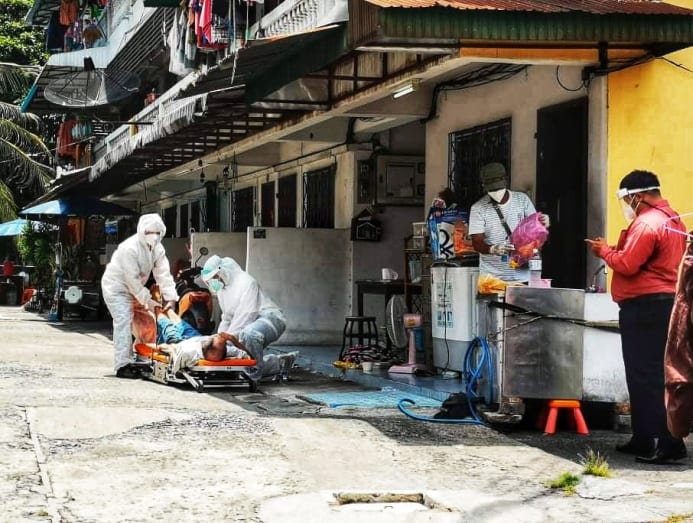
Zendai'south volunteers in white protective gear are frequently seen tending to elderly patients and the less fortunate in underprivileged areas.
Day and night, they travel around Bangkok to visit patients stuck at home, supplying them with food, medicines and oxygen cylinders to keep them alive.
"The public healthcare organisation is truly overwhelmed. Government schemes - whether it would be the habitation isolation system or the registration of patients in the yellow and cherry-red groups for hospital beds - aren't working so well only yet. Their COVID-xix testing isn't working well either. This could be because they weren't designed properly," said Zendai co-founder Chris Potranandana.
"Zendai's mission isn't just about helping people. We also want to encourage the right way to manage a organisation."
With 130 volunteers, Zendai has managed to save many lives when Bangkok'due south healthcare system is alluvion with patients.
Its latest campaign was a i-finish COVID-xix response operation, where testing facilities were fix in different parts of the uppercase. Using a simplified arrangement, people could get tested for free and transferred to appropriate healthcare programmes in one location.
If the test outcome came back positive, they could cull to be placed in dwelling isolation and receive telemedicine services co-arranged by Zendai and the Thai Cherry-red Cross Order. Infirmary referrals could too exist provided.
"We're a middleman who connects left with correct. We connect patients with hospitals - both public and private," Chris said.
"We do as much as we tin can and nosotros evidence others that when information technology comes to solving COVID-19, adept direction tin can really help."
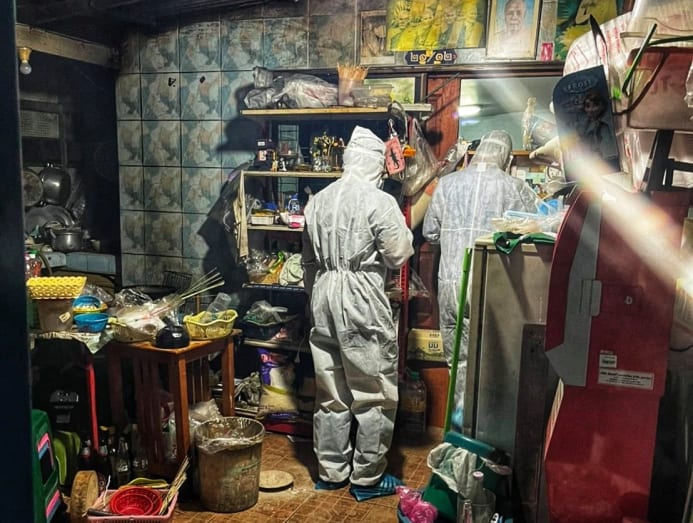
Final month, Prime number Minister Prayut Chan-o-cha admitted the healthcare arrangement was overwhelmed and apologised for the loss of life.
Speaking in parliament on Aug 31 during a no-confidence argue, he acknowledged some patients were non able to go admitted to hospitals because beds were fully occupied.
"Equally a result, I take developed field hospitals and improved them. The situation has begun to improve for a few weeks now," said the prime government minister, who eventually survived the no-conviction motility in parliament.
"Nosotros have to endeavor our best. I am sorry. I am sorry at that place were losses and afflictions. Nobody wants that to happen."
BANGKOK HEALTH System "INCOMPLETE": HOSPITAL Director
Data from the Department of Affliction Control showed that the COVID-19 situation in Bangkok is more than critical every bit compared to the other provinces.
Since the pandemic occurred, Thailand has reported 1,352,953 infections and 25 per cent of them are in the uppercase urban center. It as well recorded the highest COVID-19 death price of 5,425, or about 39 per cent of the total casualties in Thailand.
On Fri (Sep ten), the country logged 14,403 new cases, with 189 deaths.
According to Supat Hasuwannakit, director of Chana Hospital in Songkhla and chairman of the Rural Physician Society, Bangkok'due south health infrastructure was "incomplete".
Unlike other provinces, he explained, the capital city does not have wellness units at the sub-district level to behave out primary intendance or proactive healthcare work for local communities.
"In that location are sub-district wellness promoting hospitals in other provinces, which are responsible for affliction command, wellness promotion and proactive work," Supat explained. "But in Bangkok, in that location is no public health infrastructure at the sub-commune level."
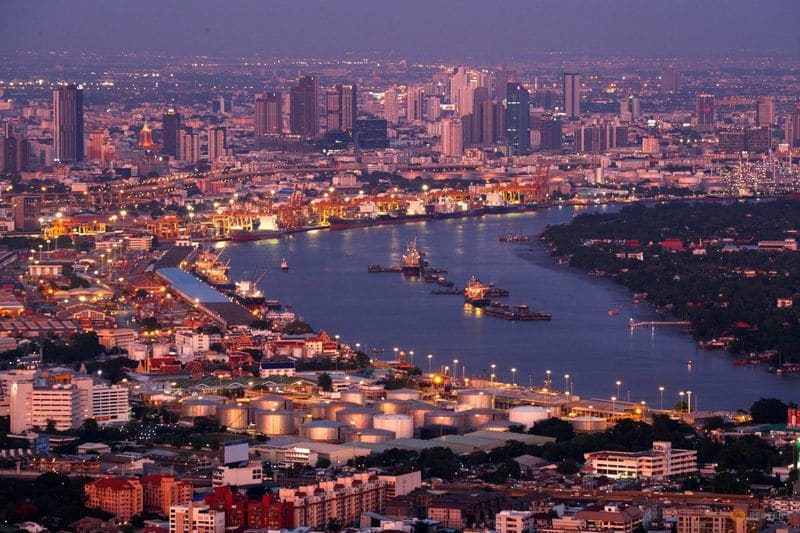
The Thai capital is densely populated. Information from the National Statistical Office showed it is home to about 6 million registered residents and two.35 million non-registered dwellers. These people live in 50 districts and share 68 public health service centres operated by the Bangkok Metropolitan Administration (BMA).
Co-ordinate to Supat, these centres practice non have enough chapters to provide proper healthcare for millions of residents during times of crunch. Every bit a result, patients have to flock to hospitals, clinics or pharmacies for health services.
"At that place are many hospitals in Bangkok but they don't practise proactive work. They just acknowledge patients and treat them. Let'south say a person was admitted for COVID-19. Doctors in the infirmary may care for him only what nigh his x family unit members? Are they infected? Who will conduct out tests for them, their neighbours or their community?" Supat said.
Months of loftier caseloads in Bangkok have exhausted its medical resource. Hospital wards are total of COVID-19 patients and many others are queuing to go in.
At the same time, patients are required to take a positive RT-PCR exam result in order to be admitted but testing remains limited, time-consuming and unaffordable for many people.
Although the situation in Bangkok has improved with fewer reported infections than before, at that place are yet many patients in communities who need urgent help from volunteers.
For Mahmud, every infinitesimal is a matter of life and death. He drives a rescue truck to transport infected people every morning and stands by every dark for astringent cases.
"If we're belatedly, fifty-fifty only slightly, their condition could be critical and we may not be able to save them in fourth dimension," he said. "Sometimes, they died just afterwards we arrived (at their homes)."
Habitation ISOLATION Organisation Existence REFINED
With the caseload spiking, home isolation has get an important solution for health government to ease the strain on medical resources. However, the system has pitfalls.
Concluding month, director-general of the Medical Services Department, Somsak Akkasilp, described the COVID-19 situation in Thailand as "disquisitional". Noting bereft hospital beds, he said it was necessary to place patients with balmy symptoms in home isolation.
"According to the process, patients will receive telemedicine services twice a day - in the forenoon and in the evening - where they report their torso temperatures and blood oxygen levels. This is a preventive measure," he said during an academic panel organised by his department.
"If their condition deteriorates, nosotros demand to know so we can take them out for treatment."
All the same, frontline workers and volunteers told CNA this has not always been the case for patients undergoing home isolation.
They have come across cases where people had no admission to medical care even though they were registered for home isolation through the authorities's hotline.
"They're hostless patients, which means they have yet to exist taken up by a hospital. As a issue, they won't receive anything until then, whether it is their medication, three meals per day or a tool kit for home isolation such as a pulse oximeter, a thermometer and paracetamol," Chris said.
"These patients are registered in the home isolation organization but they're floating aimlessly in what I'd similar to call 'an aimless and silent universe of home isolation'."
Patients who registered themselves for the plan through the government's hotline are allocated to different healthcare units past the National Wellness Security Office.
According to Bussabong Wisetpholchai, a professional registered nurse from the Order and Health Institute which is under the Public Health Ministry building, the effectiveness of habitation isolation largely depends on which hospital or health unit the patient is referred to.
Since June, she has volunteered to take intendance of patients in dwelling isolation with ComCovid. It is a community healthcare program operated by the non-turn a profit Found of HIV Enquiry and Innovation to monitor and provide treatments for COVID-xix patients with mild symptoms and those who are waiting for hospital beds.
The programme is office of a collaboration between civil society groups to help the government contain infections and prevent unnecessary hospitalisation every bit well as casualties.
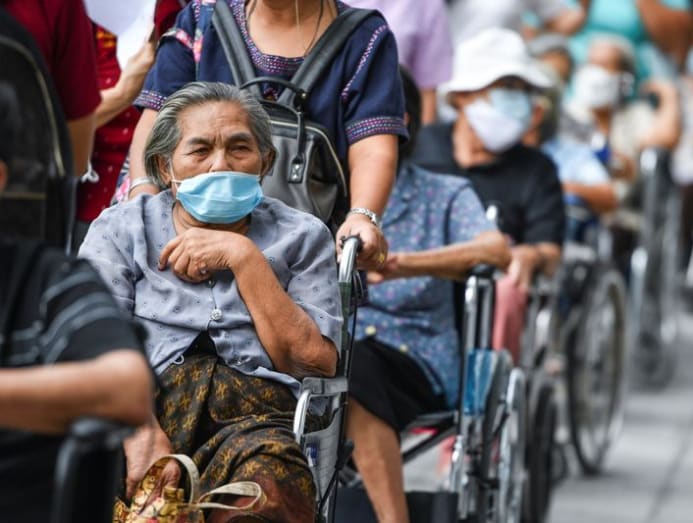
Participating patients tin can be at home or community isolation facilities. They receive daily telemedicine services for at least fourteen days from volunteer medical personnel through phone calls or the Line messenger app.
Patients are besides provided with nutrient and equipment for self-monitoring, thanks to additional support from the National Health Security Function.
"Dwelling isolation needs a support system that'due south strong enough. Patients must exist provided with a pulse oximeter and a thermometer. They must be guaranteed 3 meals a day, an ambulance that would pick them upwardly if their weather condition worsen, and a infirmary bed. They cannot be tricked into staying at home, with no admission to a hospital bed fifty-fifty when their weather turn disquisitional," Bussabong told CNA.
When she started volunteering in June, the domicile isolation arrangement was new and had many teething issues. "Some patients waited for ten days and withal nobody called them," she said.
"Just it'due south faster now, taking simply two or 3 days. This is considering at that place are more than volunteers and the plan has been solidified."
According to Nattapong Wongwiwat, deputy director of the Medical Services Department, the National Health Security Office has been developing a organization to ensure timely medical response for patients in home isolation, including medication and infirmary referral.
"Everything is all new. Hence, the chaos," he said during an bookish talk about habitation isolation last month.
"The organisation is increasingly in order. Information technology'southward just happening when there are a lot of patients. So, its efficiency and effectiveness is not good enough. Notwithstanding, we're working on it to give people opportunities and what they should get," he added.
CONSTRUCTION WORKERS LEFT ON MARGINS OF SOCIETY
Since April, the Thai government has introduced various measures and restrictions to contain the deadly virus. Public movement has been reduced by a nighttime curfew and several bans on social activities in highly infected areas such as Bangkok and its nearby provinces.
While most people take been allowed some freedom of movement, ane profession has spent at to the lowest degree a month in enforced solitude - construction workers.
In June, clusters of COVID-19 broke out at construction sites and worker camps in Bangkok. As a result, hundreds of such venues were close and sealed off for at to the lowest degree 30 days from Jun 28.
All construction work was suspended and workers were prohibited from leaving the sites, even to buy nutrient. Security officers were also employed to baby-sit the entrance and exit of camps with cases of infected people.
"It has been proven that they are hotbeds of a lot of transmissions," said the prime minister in a press briefing on Jun 25.
"The measures volition final about a calendar month only, simply a month. Please bear with it."
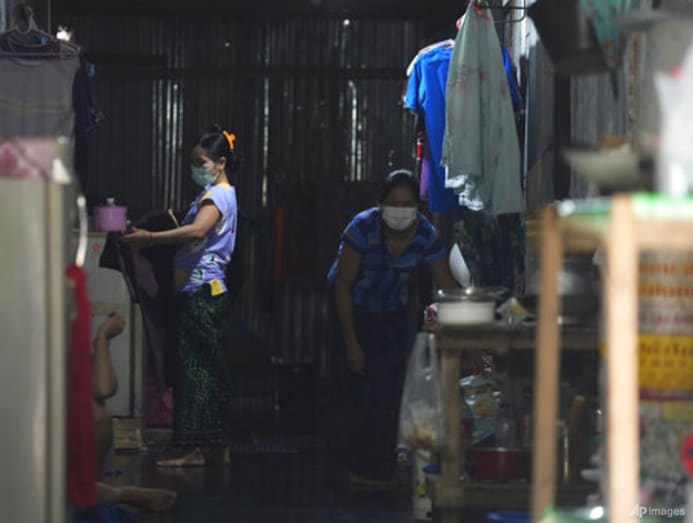
Bangkok is home to some 80,000 construction workers in more than than 500 work sites, co-ordinate to Labour Minister Suchart Chomklin. Many of them are non covered by social security and had to live with zero income for several weeks.
The regime asked structure companies to provide food for their employees, with boosted support from the Labour Ministry. The plan was to conduct proactive testing amid workers and treat those infected during the closure.
Workers who are registered in the social security system will be compensated for the period without work.
However, non everything went equally planned. Some companies took care of their employees while others left them to starve.
At a construction site in Bangkok, 154 workers could take been seriously ill if information technology had not been for volunteers who helped them with food and medical handling. Their site became a big cluster after more than 100 workers tested positive for COVID-nineteen.
From Jun 28 to Aug 2, they were locked upward in their squalid campsite without much assistance from the government. Their employer provided US$1,500 for food every week for all in the camp, only it was non enough to keep everyone from going hungry.
During the solar day, the workers had to find ways to occupy themselves exterior their scorching tin shacks before cramming into them at night.
"The space in the camp is quite crowded with narrow walkways. It's hard to walk around considering there are many workers in a small-scale infinite," said Rachaneekorn Komtang, a liaison officeholder of the construction firm that operates the site.
"It's not surprising they infected one some other."
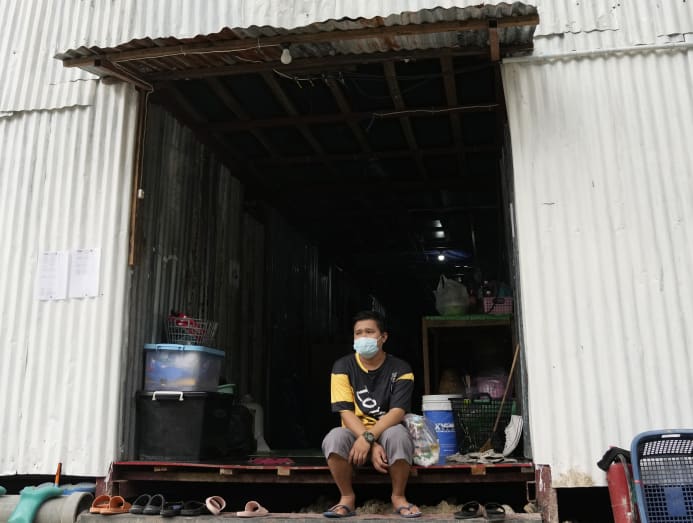
According to Rachaneekorn, the Ministry building of Labour only provided food for two weeks and it was just one repast for every one per day.
The workers had to rely on their employer and donations from the outside earth to survive. A lot of help came from a group of volunteers called No One Cares, which was formed to help construction workers with food and basic COVID-19 treatment.
"Without them, I don't know what it would have been like for the workers," Rachaneekorn said.
"They are all twenty-four hours labourers. If they don't work, they don't get paid. The regime'southward compensation is not available for them considering they don't have social security," she added.
"WHY Tin'T THE Regime Exercise ITS Job?"
No One Cares was gear up shortly later the authorities's order to seal off worker camps and structure sites. Information technology adult its own database with data of about 1,200 such venues in and effectually Bangkok as well every bit a web application that connects donors with worksites in need of help.
Donors can wait upward if there is any military camp in their neighbourhood, what assist it needs, who the contact person is and how to attain the site.
The help listed ranged from food to medicines and items for everyday life such as soap and toothpaste. The online platform too provides information on how many people at the site are infected with COVID-19 and what has been done to aid them.
Its co-founder Chaiwat Wannakhot told CNA the group specifically targets construction workers because they have been neglected and badly affected by the government's restrictions.
With limited food supply, he said many workers had to lie down in their can huts during the twenty-four hours to salvage their energy and avoid hunger.
"This is the starvation we've witnessed," he said. "People don't have food to eat, to put it but. They have no income. They accept no food."
Also nutrient, No One Cares likewise provides daily telemedicine for infected workers, forth with oxygen cylinders and medicines.
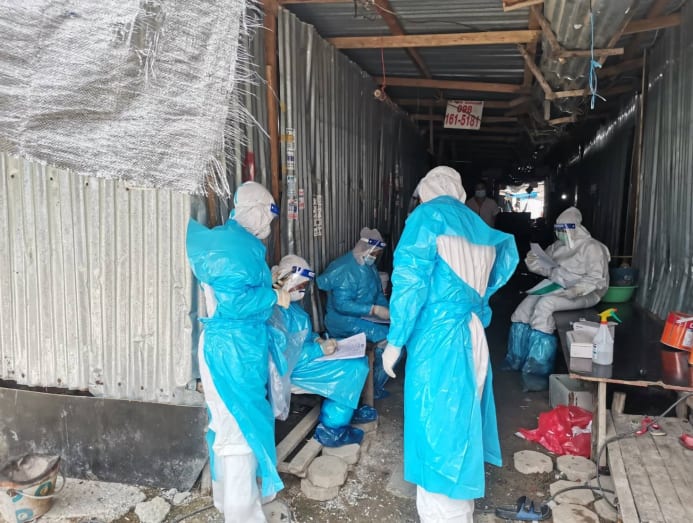
According to Chaiwat, a number of sites reported internal transmission of COVID-nineteen every bit workers were barred from leaving their camps while testing and treatments were limited.
"The plan to close these camps in society to control the disease and comport proactive testing wasn't realised. It ended up making people in the camp infect one some other," he said.
No 1 Cares' founding members felt the government has failed to do its job in taking care of people, especially those who were direct affected past its policies.
"We work so the regime can see that even volunteers similar us, who don't have many resources, tin still exercise and then much. Nosotros tin can take intendance of people in the camps and the unwell. Why can't the government practise its job? This is what we want to show," Chaiwat told CNA.
"It'south not a proficient thing for our group to exist. Information technology's a bad affair," he added. "Information technology shows how much the government has failed."
Equally of Aug 10, No One Cares has helped more 1,500 people from different parts of Bangkok.
Certain restrictions were relaxed earlier this month after the daily infection rates slowed down.
Several structure sites have resumed their work and many infected workers accept recovered. Still, a number of volunteers keep working to save vulnerable patients whose calls for help have non been answered.
For Mahmud, the Zendai volunteer, his difficult work continues.
Every mean solar day, he puts on his protective suit and two face up masks. He has been driving the rescue truck for nearly five months now, lifting and carrying patient after patient. Work is exhausting but it gives him joy.
"Whenever I run into someone suffer and accept nobody to turn to, information technology'south like seeing myself in prison house before. It's just a different scenario only I call back we share the same feelings and thoughts," he said.
"I'grand happy I can help people no one cares about."
Recent Searches
Trending Topics
Source: https://cnalifestyle.channelnewsasia.com/asia/thailand-focus-civil-society-covid-19-bangkok-health-system-287346
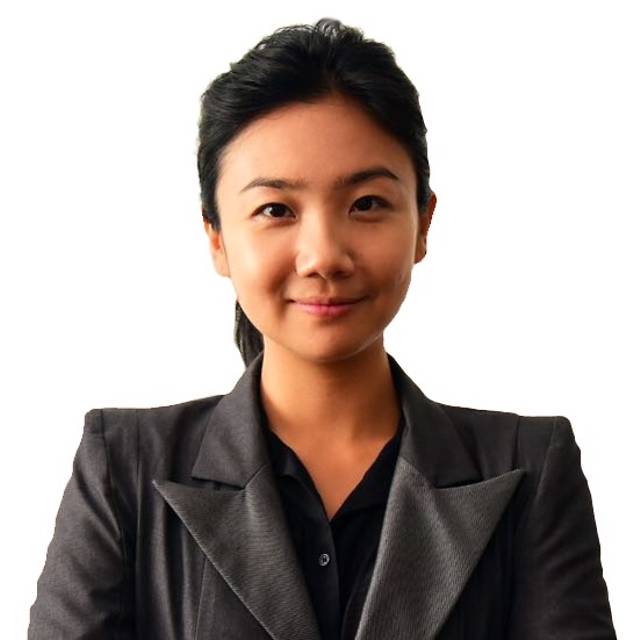

0 Response to "IN FOCUS: Thai civil society steps up as Bangkok’s public healthcare buckles under COVID-19"
Postar um comentário